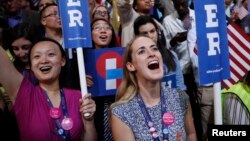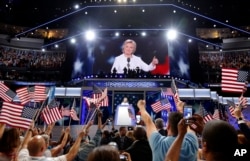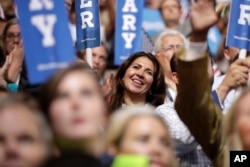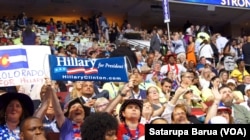Democrat Hillary Clinton’s historic selection this week as the first female presidential nominee of a major U.S. political party doesn’t mean she has the women’s vote locked up in November.
Gender and experience are not the key determining factors in an election – it’s party identification, said Larry Sabato, director of the University of Virginia’s Center for Politics.
“People always misinterpret election statistics, including the gender gap,” he said. “Republican women are not going to defect to Hillary Clinton. Democratic men are not going to defect in large measure to Donald Trump.”
A palpable sense of excitement surrounded the nomination of Barack Obama when he became the first African-American to assume the presidency in 2008.
While Clinton’s nomination has resulted in a similar but more subdued sense of optimism, polls indicate her precedent-breaking campaign may not translate into the numbers she would like.
According to a Wall Street Journal/NBC News poll, 52 percent of registered female voters from both parties support Clinton. But that share falls to 36 percent among white women ages 50 to 64 and slips to 34 percent among white women ages 35 to 49.
Republican presidential candidate Donald Trump polls at 37 percent of all registered female voters. But of those, he does better than Clinton among white women ages 50 to 64 with 54 percent and 51 percent of white women ages 35 to 49.
Women generally are more likely than men to lean Democratic, the Pew Research Center reported last year in what the research group billed as “a deep dive into party affiliation.”
Downside of success
“Secretary Clinton is in a very unique position, where women who advance in careers are seen as cold, as calculating,” said Isela Castanon-Williams, a delegate from Texas pledged to the nominee.
“There are negatives attached to us, to women who are trying to do more than other women have done.”
Most female voters understand the challenges faced by women seeking elected office, even if those voters don’t support them at the polls. In a 2016 Pew Research Center survey, 47 percent of women said they believe the major obstacle to female candidates in obtaining higher office is that they are held to higher standards than men.
Only 28 percent of men said that factor held women back. The difference in men and women on this issue is particularly striking, considering an almost equal number of men (74 percent) and women (76 percent) said males and females make equally good political leaders.
Generation gap
Women in Clinton’s generation see her candidacy as the capstone of decades of hard-fought battles to achieve equal rights.
“Sexism is omnipresent; this is bigger,” Missouri delegate Yvonne Reeves-Chong said of the nomination. “This is about my life and my granddaughter’s. I don’t think I can express how much it really, really does mean to me.”
The generational contrast is in stark relief in this convention city, as Madeleine Albright, who preceded Clinton as secretary of state, recalled Geraldine Ferraro, the vice presidential nominee in 1984.
At a National Democratic Institute discussion in Philadelphia, Albright said Clinton might not have advanced to become a major party’s nominee “if not for Geraldine Ferraro really breaking and crashing through that glass ceiling.”
Younger voters, some who weren’t even born when Ferraro broke that barrier 32 years ago, have grown up seeing American women making numerous gains. They live in a world in which more women than men have college degrees. Women are the main wage earners in four out of 10 U.S. households.
One of those younger voters is Christina Besh, a Democratic delegate from Georgia, who reasoned, “It’s not really about having a female candidate, it’s about having the right candidate.”
Clinton is at a disadvantage with millennial voters who flocked to support Bernie Sanders’ presidential campaign. According to Pew, younger women were less likely to give female leaders an edge over male leaders.
Besh said she won’t vote for Clinton in November, even though she has been a Democrat her entire life, because she is “thoroughly disgusted" by what’s going on in this election: "The fraud, the email leaks, also the classified emails. [Clinton] basically got a get-out-of-jail-free card.”
Making up the difference
Sabato said Clinton makes up for gaps among white females with a strong showing among female minority voters: “She’s getting over 80 percent of all minorities when you put all the different categories together. She may well need 85 percent or so, and she’s on the verge of getting it.”
She’ll have to count on that turnout to make up for her shortfall among white male voters, he added. “What’s not a good showing for a Democrat is that she’s losing white men by a massive majority and especially blue-collar white men.”
To succeed, Clinton will have to capitalize on Trump’s historically low poll numbers with minorities.
But in the arena where Clinton secured the historic nomination, Texas delegate Mary Lou Tevebaugh wasn’t concerned by the possible gaps in the female vote.
“I laugh a little when people say we’re not excited,” she said of the level of enthusiasm for Clinton this November. "I like to say that there’s a burn for Bernie and a slow boil for Hillary."







